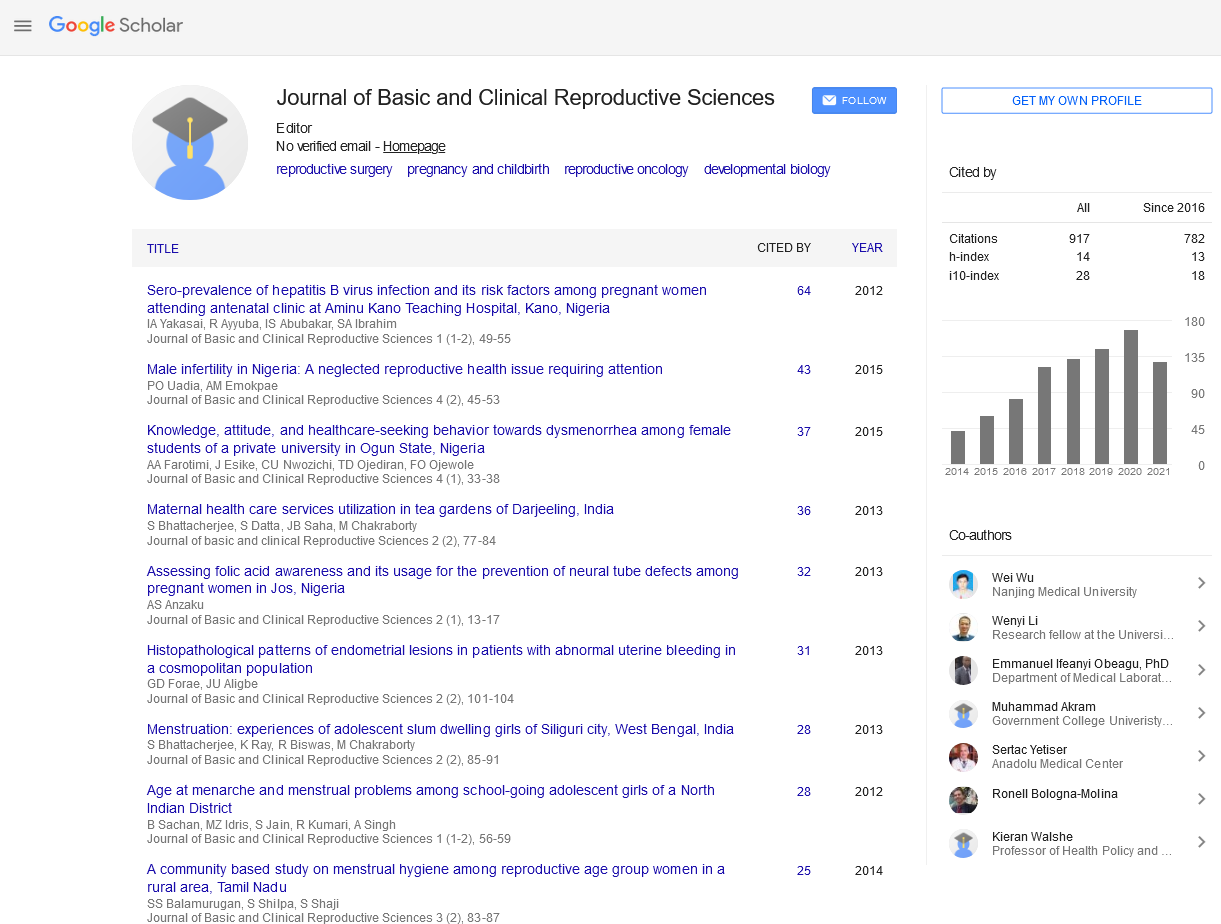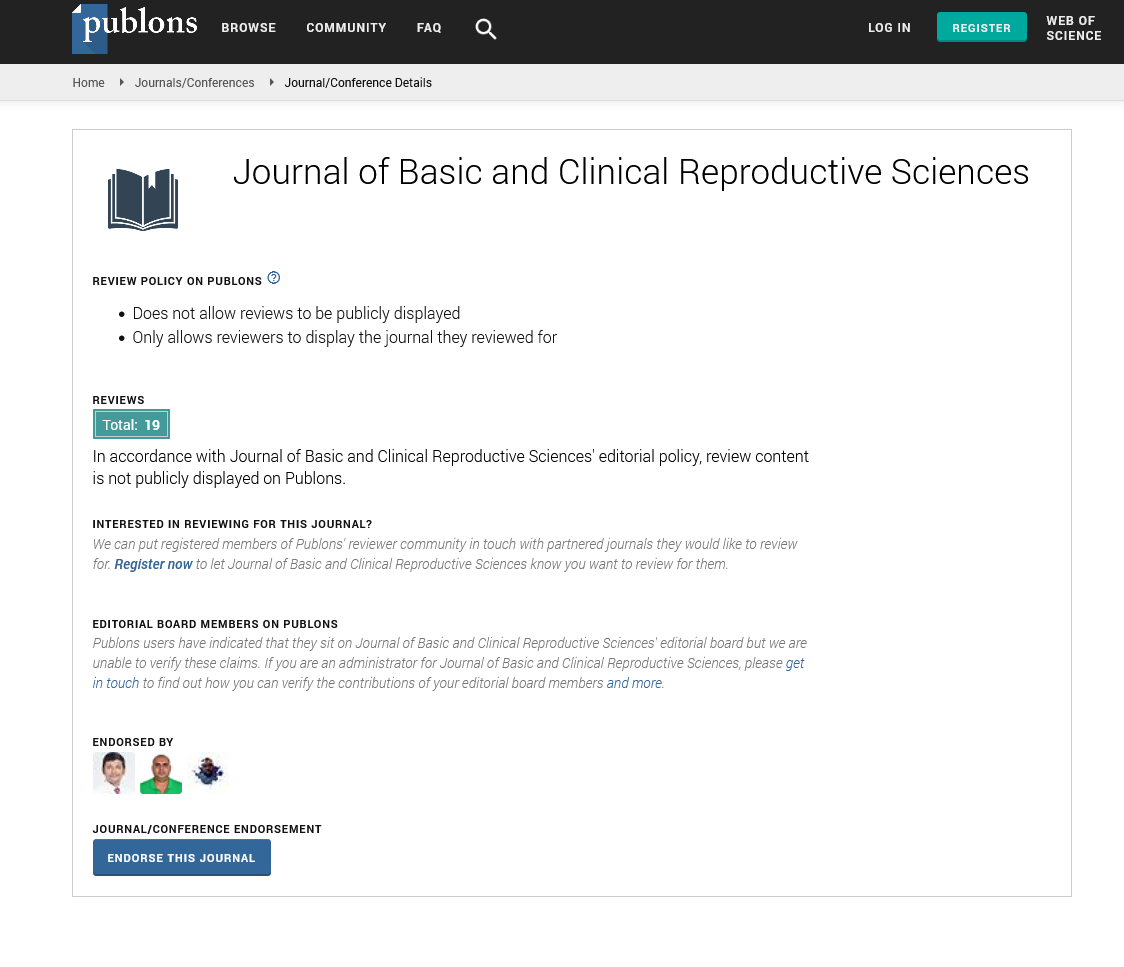Short communication - Journal of Basic and Clinical Reproductive Sciences (2023) Volume 12, Issue 4
Nutritional Physiology of Pregnancy: Maternal and Fetal Metabolism in Focus
Received: 31-Jul-0223, Manuscript No. JBCRS-23-114416 ; Editor assigned: 02-Aug-2023, Pre QC No. JBCRS-23-114416 (PQ); Reviewed: 16-Aug-2023 QC No. JBCRS-23-114416 ; Revised: 23-Aug-2023, Manuscript No. JBCRS-23-114416 (R); Published: 30-Aug-2023
This open-access article is distributed under the terms of the Creative Commons Attribution Non-Commercial License (CC BY-NC) (http://creativecommons.org/licenses/by-nc/4.0/), which permits reuse, distribution and reproduction of the article, provided that the original work is properly cited and the reuse is restricted to noncommercial purposes. For commercial reuse, contact reprints@pulsus.com
Description
From conception to childbirth, it is a journey filled with physical, emotional, and psychological changes. Proper nutrition during pregnancy is crucial for the health and well-being of both the mother and the developing baby. Nutrition plays a pivotal role in pregnancy [1]. A well-balanced diet provides essential nutrients needed for foetal growth, development, and maternal health. It can also help prevent complications such as gestational diabetes and preeclampsia. The journey of pregnancy begins with conception, when a sperm fertilizes an egg. The fertilized egg then implants itself into the uterine lining, marking the start of pregnancy. During these early weeks, rapid cell division occurs, and vital organs and structures form. During pregnancy, a woman’s body undergoes numerous physical changes [2,3]. The most noticeable is the growth of the abdomen as the uterus expands to accommodate the growing foetus. Hormonal shifts lead to various symptoms, including morning sickness, breast tenderness, and fatigue. Prenatal care is essential for monitoring the health of both the mother and the developing foetus. Regular check-ups, ultrasounds, and blood tests help identify and address any potential issues [4]. Proper nutrition and prenatal vitamins are also crucial to support the baby’s growth and development. Pregnancy can be an emotionally charged time. Hormonal fluctuations can lead to mood swings, and anxieties about childbirth and parenting may arise. Building a strong support system and seeking counselling when needed can help manage these emotions. Pregnant women should gain weight steadily throughout pregnancy, but excessive weight gain can lead to complications [5]. Monitoring weight and discussing a healthy weight gain plan with a healthcare provider is essential.
Phases of development
Many women experience relief from early pregnancy symptoms, and the baby’s movements become more noticeable. This is also the time for gender reveals and baby showers. In second trimester Organs and systems mature, and the baby’s senses develop [6,7]. Expectant parents may opt for additional tests, such as amniocentesis, to assess the baby’s health. As the due date approaches, preparations for childbirth become a focal point.
This includes choosing a birthing plan, selecting a healthcare provider, and attending prenatal classes [8]. Understanding the stages of labour and various birthing options empowers expectant parents. The third trimester brings its own set of challenges, including increased discomfort, swelling, and the need for more frequent check-ups. The baby’s position and readiness for birth are closely monitored [9]. Childbirth is a unique and intense experience. Understanding the stages of labour, pain management options, and potential complications can help expectant parents make informed decisions about their birth plan [10]. After childbirth, the postpartum period begins. It is a time of physical recovery and emotional adjustment. New parents must take care of their own well-being while caring for their new-born.
Conclusion
Pregnancy is a transformative journey filled with physical, emotional, and psychological changes. By understanding and embracing the various stages and challenges of pregnancy, expectant parents can navigate this journey with confidence and joy. Nutrition during pregnancy is a fundamental aspect of prenatal care. A well-balanced diet that includes key nutrients, appropriate weight management, and attention to food safety is essential for the health of both the mother and the developing baby. By following this roadmap to healthy eating during pregnancy and seeking guidance from healthcare providers, expectant mothers can ensure the best possible start for their child.
References
- Richter JE. The management of heartburn in pregnancy. Aliment Pharmacol Ther. 2005; 22(9):749-57.
- Phelan JP. Myomas and pregnancy. Obstet Gynecol Clin. 1995; 22(4):801-5.
- Molitch ME. Pregnancy and the hyperprolactinemic woman. N Engl J Med. 1985; 312(21):1364-70.
- Chard T. Pregnancy tests: a review. Hum Reprod. 1992; 7(5):701-10.
- Williamson CS. Nutrition in pregnancy. Nutr Bull. 2006; 31(1):28-59.
- Patel MA, Aliporewala VM, Patel DA. Common antifungal drugs in pregnancy: risks and precautions. J Obstet Gynecol India. 2021; 71(6):577-82.
- Mangino FP, Ceccarello MA, Di Lorenzo GI, et al. Successful rescue hysteroscopic resection of a cervical ectopic pregnancy previously treated with methotrexate with no combined safety precautions. Clin Exp Obstet Gynecol. 2014; 41(2):214-6.
- Scholl TO, Hediger ML, Belsky DH. Prenatal care and maternal health during adolescent pregnancy: a review and meta-analysis. J Adolesc Health. 1994; 15(6):444-56.
- Joyce TJ, Grossman M. Pregnancy wantedness and the early initiation of prenatal care. Demogr. 1990; 27(1):1-7.
- Campbell DM, Hall MH, Barker DJ, et al. Diet in pregnancy and the offspring's blood pressure 40 years later. Int J Obstet Gynaecol 1996; 103(3):273-80.


